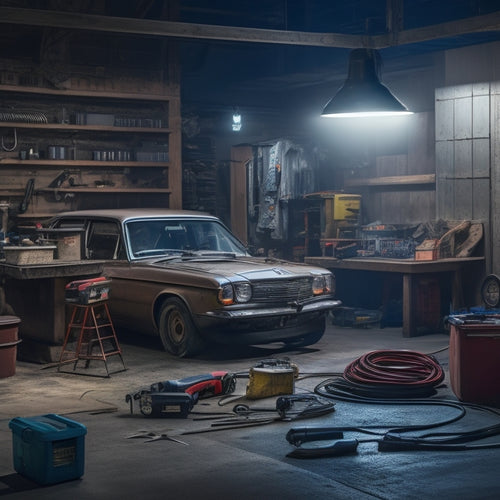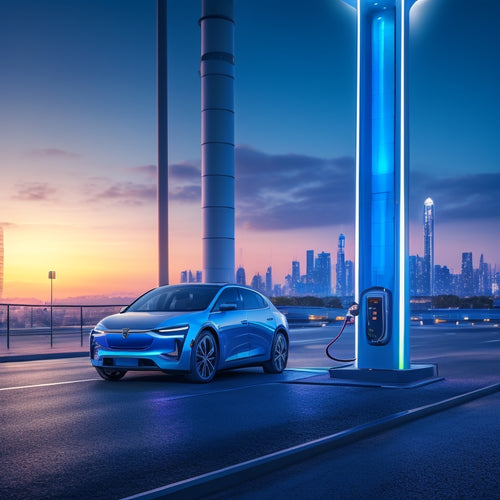
Top Off-Grid Solar Panel Systems for Homes
Share
When choosing an off-grid solar panel system for your home, consider top brands like Renogy, WindyNation, and HQST, which offer high-quality systems and accessories. These brands provide warranties ranging from 10 to 25 years, giving you peace of mind. To get the most out of your system, you'll need to understand the key components, including solar panels, charge controllers, battery banks, inverters, and mounting hardware. By selecting the right combination of components and optimizing energy usage, you can achieve energy independence and reduce your environmental footprint. Learn how to configure and maintain your system for maximum efficiency.
Key Takeaways
• Consider top off-grid solar panel brands like Renogy, WindyNation, and HQST, which offer high-quality systems and accessories.
• Ensure the system is sized correctly by conducting a load calculation to determine total energy requirements.
• Choose the right combination of components, including solar panels, charge controllers, battery banks, inverters, and mounting hardware.
• Proper installation is crucial, considering roof orientation, shading, and ventilation, and regular battery monitoring is essential.
• Opt for a system with a comprehensive warranty, such as Renogy's 25-year warranty, to ensure long-term performance and support.
Top Off-Grid Solar Panel Brands
When going off-grid, selecting a dependable brand is crucial, and you'll want to consider top off-grid solar panel brands like Renogy, WindyNation, and HQST that offer high-quality systems and accessories. These brands are known for their reliability and durability, guaranteeing you receive the power you need.
In terms of warranty comparison, Renogy offers a 25-year warranty on their solar panels, while WindyNation provides a 20-year warranty. HQST offers a 10-year warranty, but it's still a trustworthy option. Brand reliability is essential when going off-grid, as you'll be depending on your system for power.
When evaluating these brands, consider factors like product quality, customer support, and warranty length. You'll want a brand that backs their products and offers dependable customer support.
Key Components of Off-Grid Systems
Designing an off-grid solar panel system requires thoughtful evaluation of several key components that work together to provide reliable power, including solar panels, charge controllers, batteries, inverters, and mounting hardware.
These components work in harmony to convert sunlight into electrical energy, store excess energy for later use, and provide a stable output voltage.
| Component | Function |
|---|---|
| Solar Panels | Convert sunlight into electrical energy |
| Charge Controllers | Regulate energy flow to batteries |
| Battery Banks | Store excess energy for later use |
| Inverters | Convert DC power to AC for home use |
| Mounting Hardware | Secures solar panels to your roof or ground |
As you design your off-grid system, you'll need to take into account factors like your energy needs, available sunlight, and battery capacity. By selecting the right components and configuring them correctly, you can enjoy reliable, renewable energy in your home.
Benefits of Off-Grid Solar Energy
By tapping into the power of off-grid solar energy, you can access a multitude of benefits that transform the way you live, work, and interact with the environment. One of the most significant advantages is Energy Independence. With an off-grid solar panel system, you're no longer reliant on the grid, reducing your energy bills and protecting yourself from rising utility rates. You'll have the freedom to generate your own clean energy, whenever and wherever you need it.
Off-grid solar energy also promotes Environmental Stewardship. By harnessing the sun's power, you're reducing your carbon footprint and minimizing your contribution to climate change. This sustainable energy source reduces greenhouse gas emissions, preserving the environment for future generations.
Moreover, off-grid solar energy systems are quiet, non-polluting, and require minimal maintenance, making them an attractive option for environmentally conscious homeowners. By embracing off-grid solar energy, you'll not only reduce your energy costs but also contribute to a cleaner, healthier planet.
System Sizing and Configuration
To guarantee that your off-grid solar panel system meets your energy needs, you'll need to accurately size and configure the system, taking into account your specific energy requirements, available space, and local climate conditions. This involves conducting a thorough load calculation to determine the total energy requirements of your home or building.
You'll need to take into consideration factors such as energy efficiency, appliance usage, and energy storage needs.
To ensure a well-designed system, contemplate the following key factors:
-
Load calculation: Determine the total energy requirements of your home or building, including appliance usage and energy storage needs.
-
System configuration: Choose the right combination of solar panels, inverters, and energy storage systems to meet your energy needs.
-
Energy efficiency: Optimize energy usage by selecting energy-efficient appliances and implementing energy-saving strategies.
- System monitoring: Install a monitoring system to track energy production, consumption, and system performance.
Installation and Maintenance Tips
You'll need to meticulously plan and execute the installation of your off-grid solar panel system to guarantee maximum energy production and minimal maintenance. Proper installation is important to ensure your system operates efficiently and effectively. It's imperative to take into account factors like roof orientation, shading, and ventilation to optimize energy harvesting.
During installation, make sure all components, including batteries, are correctly connected and configured. Regular battery monitoring is crucial to identify potential issues before they become major problems. Invest in a high-quality monitoring system that provides real-time data on your battery's state of charge, voltage, and temperature.
Regular maintenance is also essential to maintain your system's performance. Panel cleaning is an often-overlooked task that can have a significant impact on energy production. Dirt, dust, and debris can reduce your system's efficiency by up to 25%.
Clean your panels every 6-12 months, or more frequently if you live in a dusty or polluted area. By following these installation and maintenance tips, you'll be well on your way to maximizing your off-grid solar panel system's potential and enjoying a reliable source of power.
Frequently Asked Questions
Can I Use Off-Grid Solar Panels With a Septic System?
You can use off-grid solar panels with a septic system, but consider the water requirements for wastewater treatment and implement water conservation measures to minimize your system's overall water demand.
How Do I Handle Snow Load on My Off-Grid Solar Panels?
As winter's chill sets in, don't let snowflakes suffocate your off-grid solar dreams! You'll need to tackle snow removal regularly, ensuring your panels are angled between 30-40 degrees to allow snow to slide off, maintaining your energy independence.
Are Off-Grid Solar Panels Compatible With All Roof Types?
You'll find that off-grid solar panels are compatible with most roof types, but it's important to take into account the roof material and installation methods. For instance, asphalt shingles require a different approach than metal or tile roofs, ensuring a secure and efficient setup.
Can I Add a Generator to My Off-Grid Solar Panel System?
Did you know that 75% of off-grid solar systems incorporate backup generators? You can add a generator to your system, considering fuel options like diesel, propane, or natural gas, and guarantee proper system sizing for seamless integration.
Do Off-Grid Solar Panels Require Special Electrical Permits?
When installing off-grid solar panels, you'll need to navigate the permitting process, which includes meeting specific inspection requirements, ensuring your system complies with local building codes and regulations, before getting the green light to power up.
Related Posts
-

Charge Your Ride With Renewable Energy Solutions
By immersing yourself in renewable energy sources like solar power, you can greatly diminish your carbon footprint an...
-

Why Recharge Your Car Battery With DIY Power?
By switching to DIY solar power, you can drastically reduce your reliance on expensive battery services, lower your c...
-

What Does EV Charging Station Installation Cost?
You can anticipate paying between $300 to $1,500 or more for an EV charging station installation, depending on the ty...


